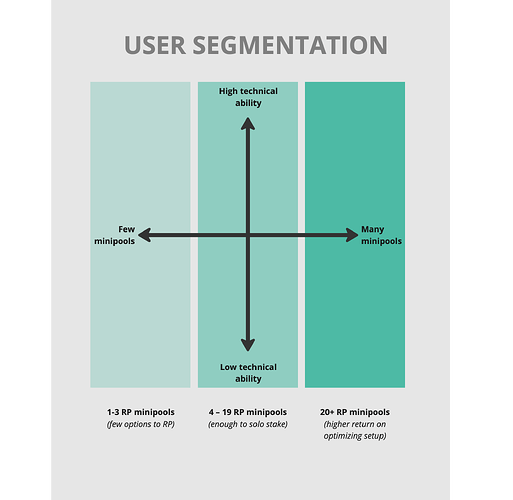Hi, I’m lansman from OpenUX. We have been onboarding our recent project on node operator UX that was arranged through the latest grants round, thank you for letting us work with you! If you want to know more about this project you can check the project hub where we’ve gathered relevant info, links etc.
- link to project hub -
We’re working to keep the process as transparent as possible, thus, here’s an update on where we are. We have been shaping a user segmentation for the work we’ll be doing based on input from the wider community (sources: RP Discord, RP Forum, Reddit discussions [RP & ethstaker], and discussions with people from the community and the team). Based on this we’re working with the assumption that two key dimensions for segmenting NOs are their level of technical ability and the number of nodes they run.
This segmentation model is designed to be simple and intuitive and to nuance our understanding of NOs, i.e. we’re trying to find critical vectors where users’ behaviors and attitudes vary distinctly. I want to emphasize that this is not a market segmentation that is trying to identify the attractiveness of different user groups, we’re just interested in relevant differences in why NOs choose Rocket Pool.
The segmentation model and the reasoning behind currently looks like this:
Why “Number of minipools”
Understanding how behaviors and attitudes vary between node operators with few vs many minipools is valuable to Rocket Pool since these user groups are assumably attracted by different parts of Rocket Pool’s value proposition.
For people with few minipools, the fact that Rocket Pool makes it possible to stake less than 32 ETH may be a critical benefit. For people with many minipools, the value proposition may differ since they have the option to do solo staking. This study will pay attention to needs, behaviours or attitudes that correlate with the number of minipools a node operator runs.
Why “Level of technical ability”
Understanding the attitudes and behaviors of node operators with varying technical abilities can reveal important patterns in why people choose Rocket Pool over alternatives. Exploring the differences between these groups can uncover unmet needs and patterns in user segments.
The study will pay attention to edge cases that node operators with high technical ability might represent, e.g. innovators within areas such as scripts & Linux configurations, performance monitoring as well as hardware and software setup. Insights from innovators pushing such boundaries can inspire the roadmap for the protocol and smartnode stack.
Why the combination of these dimensions
Rocket Pool’s value proposition beyond democratization
Democratization is an important part of Rocket Pool’s value proposition. Rocket Pool makes running a node available for (a) people with less than 32 ETH, and (b) for people who might not have the technical skills or confidence to do solo staking. Because these benefits (USPs) are highly differentiated, it will be very informative to explore users who are attracted to Rocket Pool for reasons beyond these (i.e. people with 32+ ETH and high technical ability). Is there a pattern to who these users are? What are the benefits that stand out to these users and what does their consideration set look like, i.e. what are these users comparing Rocket Pool with?
